Comfortable off-grid RV living depends on the availability of enough electricity to power your appliances.
You can reduce demand by using energy-efficient appliances wherever possible or even cutting back.
Maximising the supply of electricity with a well-sized solar setup and a battery to battery charger will help charge the battery bank.
And increasing the battery bank to provide an extra store of electricity so you can manage between electric hookup facilities will help too.
But there are some scenarios where your RV electrical design can’t provide enough power despite your efforts.
If you travel in hot, humid areas where air-conditioning units are essential for your lifestyle, a 12v battery bank won’t be enough even with a massive solar array.
If you live in your van full-time and depend on power tools for a living, your solar setup may not be enough.
An RV generator can make up a shortfall in your electrical supply.
But there’s so much to figure out when deciding on the best generator. There are many brands, different sizes, fuel types, and more.
So what are the best portable generators for RVs, campervans, and motorhomes? Read on!
When you click on links to various merchants on this site and make a purchase, this can result in this site earning a commission. As Amazon Associates, we earn from qualifying purchases. For more info, please check our disclosure page.
At A Glance: Our Top Picks of RV Generators
- Best Portable RV Generator: Honda EU2200i
- Best In-built RV Generator: Cummins Onan QG 4000
- Lightest RV Generator: Yamaha EF 2000iSv2
- Best Dual Fuel Generator for RVs: Champion 3400w Dual Fuel
- Best Value Large RV Generator: WEN 56380i Super Quiet 3800-Watt
What Is A Generator & How Does It Work?
A generator converts mechanical energy to electrical energy.
The engine turns, supplying mechanical energy to the alternator where it’s converted.
It works in much the same way as your vehicle’s alternator.
In your camper, the alternator has a diode pack to convert the AC output to DC. You use this DC output to charge the starter battery and leisure batteries with either a B2B charger or a split charge relay.
The primary purpose of the RV generator is to output AC power. Many models provide a DC outlet, too.
Do I Need a Generator for My RV?
The short answer is no.
There’s plenty of things you can do to minimise how much electricity you use and maximise how much you generate.
Use our online solar calculator to size your electrical system to meet your demand.
Even so, no matter how big your camper’s solar system, it’s unlikely to be big enough to run power-hungry air-conditioning units and heavy use of multiple AC appliances.
Not convinced?
A 3000w RV air-conditioning unit uses about 230 amps from a 12v battery every hour (3000w ÷ 12v). This doesn’t even account for the power cost of converting DC to AC, so the reality is higher.
Run it for a couple of hours, and even a 400ah lithium-ion battery bank will be flat. With peak sun of around 4 hours a day, you’ll need over 1200w of solar panels on your roof.
The upshot is if you want to dry camp or boondock and use power-hungry AC appliances at the same time, you need an RV generator.
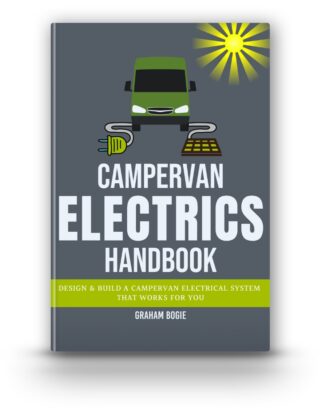
Everything you need to know about campervan electrics. Now available in ebook and paperback!
Learn how to design, size, install and troubleshoot your camper’s electrical system.
RV Inverter Generator vs Regular Generator
Have you ever walked by a construction site and seen (and more likely heard) the generators running?
These are typical conventional generators. They work by maintaining a constant engine speed and output, regardless of the load. When more load is added, the engine consumes more fuel to maintain the RPM.
It makes them inefficient, noisy, and not something you’d be keen on having anywhere near your camper.
An inverter generator works in a slightly different way. With a low load, an inverter generator’s engine runs at a slower speed, so it is more fuel-efficient and less noisy. As load increases, the engine runs faster, fuel efficiency falls, and noise increases.
If you’re buying a generator for your RV, an inverter generator is the sensible choice.
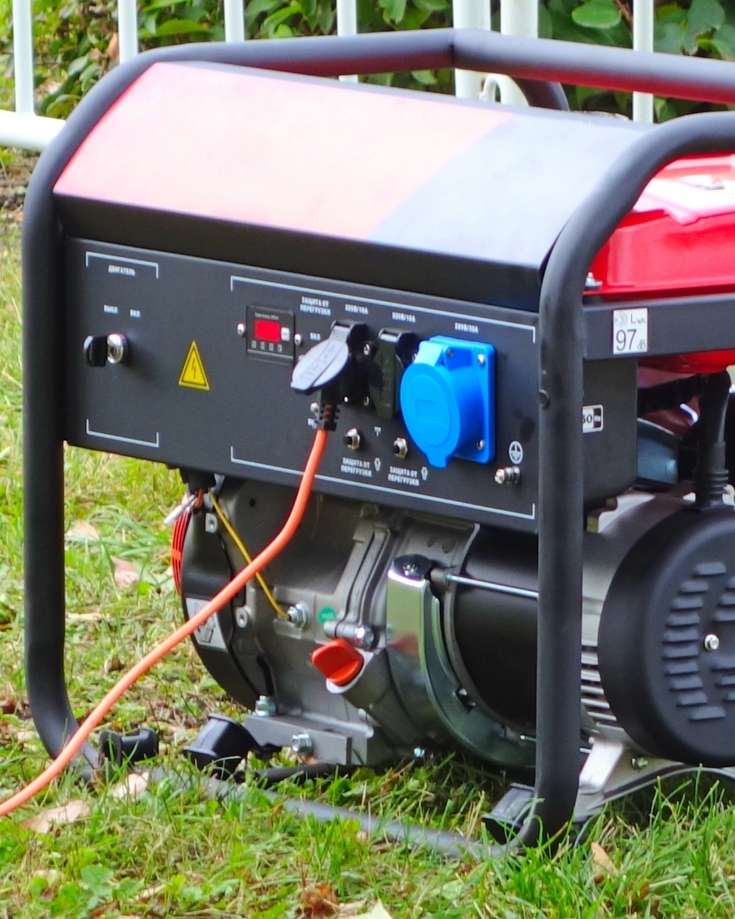
Pros & Cons Of RV Inverter Generators
The only way to take advantage of an RV fully loaded with convenient AC appliances and boondock is to have a generator.
It provides power on demand and lets you run your air-conditioning unit. You don’t have to depend on the weather for solar energy.
But for all the advantages a generator provides, there are some cons to take into account.
Generators are noisy. Inverter generators are inherently much quieter than their conventional alternatives, but they’re not silent. It’s worth bearing this in mind if you’re hoping for some peace and quiet in the wilderness for a few days or weeks at a time.
Generators create polluting emissions, so you’ll need to consider how close to your RV you set it up. Consider any neighbours nearby too.
Generators need fuel. Unlike solar energy, generators need to fuel, and you’ll need to carry enough for your needs. In-built generators tap into the camper’s onboard fuel tanks, but the portable models need to be refilled.
Running costs. Mechanical engines need maintenance. Regular servicing and oil changes are all par for the course.
Generators can weigh in at 44lb and more, depending on the model. Weight is an important consideration for vehicle handling. And make sure you can physically lift the generator in and out of your RV, too.
They are bulky machines, so they take a fair amount of onboard storage space.
Inverter generators don’t take kindly to being operated in bad weather. Either make a DIY rain cover or buy a cover designed to work while the generator is running.
Built-In Generators
Often installed by the coachbuilder, built-in generators are a permanent fitting in many RVs. Unlike the portable models, you can run them in situ.
They’re pre-wired to the camper’s electrical system, so easy to start up. Because they tap into the vehicle’s fuel tank, you won’t need to carry extra fuel tanks either.
Built-in generators often provide more power than portable models, but they tend to be more expensive.
Because they’re a permanent feature, accessing the generator for maintenance and servicing can be awkward.
And if you use a company to do the maintenance for you, you’ll need to bring the RV for the job’s duration.
Always fit a CO alarm with a built-in generator. Though they are vented outside, any problems leading to fumes entering an open window or roof hatch can be deadly.
What Size Generator Do I Need For My RV?
One of the main factors when considering which generator to buy is its output.
Most generator manufacturers state the output in two figures: startup watts and running watts, sometimes called surge watts and continuous or rated watts.
Startup, or surge watts, indicates the maximum power the generator can produce in a short burst. Some appliances, like air-conditioning units and refrigerators, need a lot of power to get going, then use less power to keep running.
Running or rated watts indicate the power the generator can continuously produce. This is usually the rated value included in most model names.
You need to work out the total simultaneous load you’ll put on the generator to determine what size generator you need.
Add up the running watts of the AC appliances you’ll use at the same time to get the minimum running watts you need from your generator. It’s probably best to add a bit of wriggle room too.
Then look at any startup watts your appliances need. You’ll need to make sure the generator’s surge rating can meet at least the highest of those numbers.
Remember, the surge rating will need to be big enough to cope with an appliance starting up plus any load already running.
If you overload the generator, at best, you’ll trip a breaker, and at worst, you’ll damage your appliances or even the generator.
Suitable Generator Size
If you have a handful of relatively small AC appliances, you can probably get away with a generator up to 3000w.
It’s big enough to run a microwave, television and even a hairdryer and coffeemaker.
Given it’s unlikely you’ll be running these appliances at the same time, something between 2000w and 3000w is plenty big enough.
If running an AC refrigerator, remember the compressor’s startup watts switch on and off to regulate the inside temperature.
Double-check your numbers and make sure not to use too much load at a time.
What Size RV Generator To Run Air-Conditioning Units?
Air-conditioning units are power-hungry. They demand large startup watts to get going and then run at anything up to 2000w, perhaps more.
If you have an air-conditioning unit and want to run it off-grid, you’ll need a powerful generator or at least 3500w. If you have 2 air-con units, then you’ll need one even bigger.
More powerful generators usually carry higher price tags, so make sure to size it to meet your needs and add a few watts for contingency.
How to Charge the 12v Battery Bank from the Generator
A portable inverter generator provides power to your RV in the same way as if you were plugged into a shore power pedestal.
You can use the same extension cord to connect your RV to the generator. If your cord isn’t compatible, you can use an adaptor.
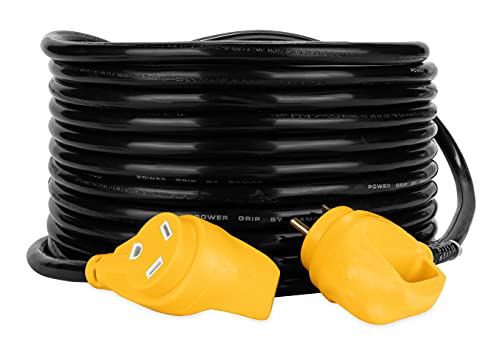
110v, 30 amp, 25′ hookup cord suitable for use in US
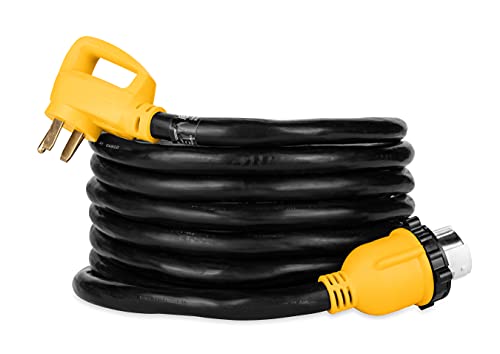
110v, 50 amp, 4 core 50′ hookup cord suitable for use in US
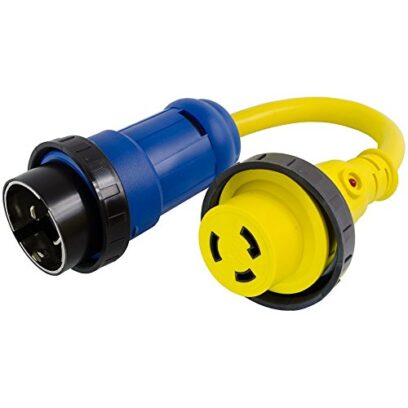
50 amp shore to 30 adaptor
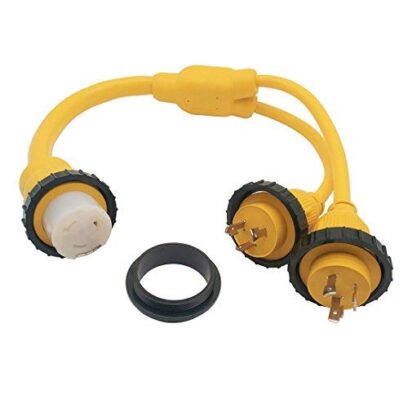
30 amp shore to 50 adaptor
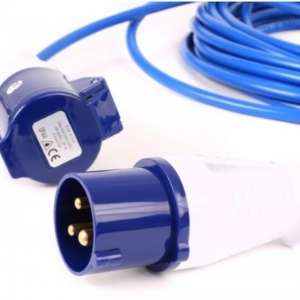
Extension Lead 16A 230V 14m
If your camper is fitted with a battery converter (or battery charger), it will continue to operate in the same way without any adaptations.
Do I Need A Transfer Switch For My RV Generator?
If you were to combine two AC inputs at the same time, you’re going to have a bad day. The sine waves from each supply would try to become physically synchronised.
It’s a scenario you must avoid.
Built-in, onboard generators are wired directly to the RCD. If you were to plug into shore power with the generator running, you’re going to have a problem.
To avoid this, a transfer switch is fitted before the RCD, and the inbuilt generator and shore power are wired through it. It’s a 3-way switch with 2 inputs and 1 common output.
If the transfer switch detects an AC generator in an RV, it’ll take power from there. Otherwise, it’ll take power from the hookup.
This prevents the AC from ever combining.
With a portable generator, the risk of combining both the shore power and generator AC is negligible. If you have shore power, you probably won’t take out the generator. And even if you do, you probably only have one hookup box on the side of your camper.
So, in short, if you have an inbuilt generator, you need a transfer switch. For a portable generator, you do not.
Do I Need To Ground A Portable RV Generator?
Yes!
Follow the manufacturer’s instructions and NEVER use a portable generator unless it’s grounded.
Otherwise, YOU may become the path to Earth, and that would hurt! A LOT! As in, it might kill you.
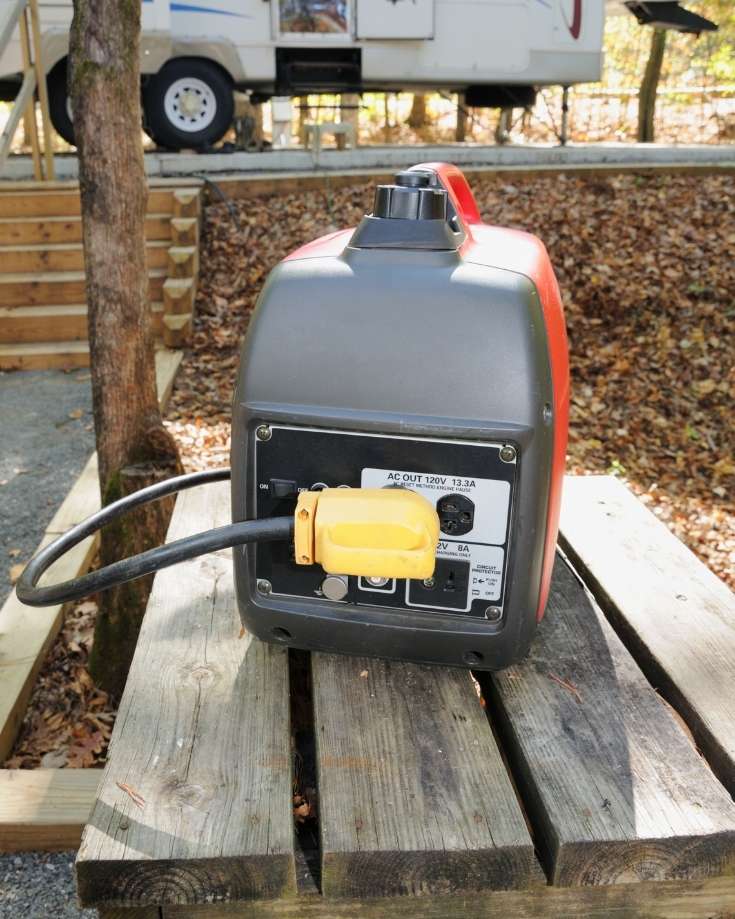
Things to Look for When Buying an RV Generator
Here are a few different features and specifications to look out for when comparing RV generators.
Fuel & Efficiency
Sourcing fuel is a crucial consideration when choosing a generator. The most obvious choice is to use the same fuel your camper runs on.
Diesel generators are more efficient than their gasoline/petrol alternatives. They produce less carbon dioxide (better for the atmosphere) but more nitrogen oxide (not so great for our health).
Compared to gas, diesel generators need far less maintenance and tend to have a longer life too.
And diesel isn’t flammable, making these generators a little safer. The choice of portable diesel inverter generators for RVs is somewhat lacking. There’s more choice for built-in generators, though.
Petrol/Gas generators are less efficient, produce more carbon dioxide but less nitrogen oxide than diesel generators.
They are the most common and readily available of all RV generators on the market. There are plenty of brands and models available.
Some models offer a dual-fuel option of gas and propane, a good choice if propane is sometimes available.
Propane generators for RVs are becoming more popular. Because propane isn’t so readily available, their popularity is still behind the gas alternatives.
Propane is less efficient than gasoline but because of their lower environmental impact, as propane becomes more widely available, so too will these generators.
Physical Size & Weight
We’ve mentioned earlier that generators are hefty contraptions.
When choosing a generator, make sure you check where you can store it, and you have the strength to lift it in and out.
Noise Levels
Generators are inherently noisy, arguably one of their biggest disadvantages. Nobody wants to have a noisy machine continually humming in the background.
Depending on where you camp, there are regulations on noise levels.
We recommend opting for a closed frame generator with less than 60 decibels dB(A), which is about the same as a normal conversation.
USDA Forest Service Approved Spark Arrestor
Combustion engines, like those on a generator, emit tiny, hot carbon particles. At worst, they could cause a fire.
Many generators have an arrester fitted to capture the particles before their emitted, so reducing the risk. They need regular maintenance to make sure they don’t clog up.
Without a USDA Forest Service approved spark arrestor, you cannot use a generator in US national forests.
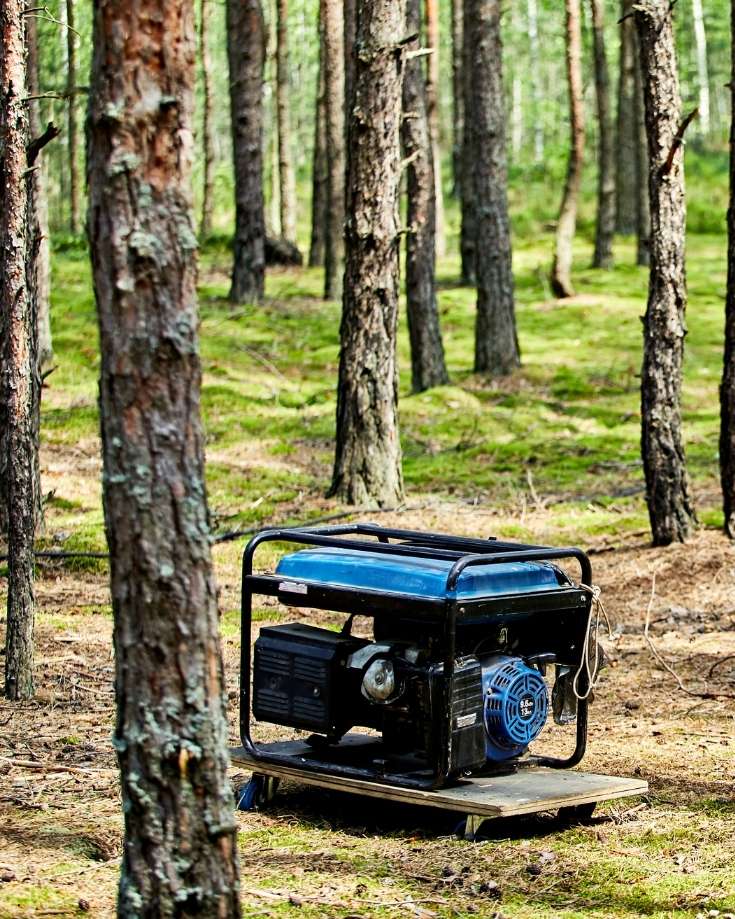
Altitude Kits
Your generator needs air to operate and burn the fuel. The air becomes thinner at higher altitudes, so it’s more difficult for the generator to operate.
Most generators will run well up to about 5000 feet (or 1500 metres). However, it can be a challenge to find the information on the specifications.
As a rule of thumb, the power falls at around 3.5% for every 1000 feet above sea level you climb. It may differ between models, but if you can’t find the manufacturer’s spec, we recommend using this as a guide.
Some models can be adapted with an altitude kit. It adjusts the fuel injection rate so the generator can operate safely at higher altitudes.
It’s essential to use the correct altitude kit for your brand.
Always check with the manufacturer how to safely install the altitude kit and if the warranty is affected by the modification.
CARB Compliance
California and other US states have adopted CARB standards to help reduce carbon dioxide and nitrogen oxide emissions.
Most modern portable generators for RVs are now CARB compliant. The certification assures you that you’re buying a quality product produce relatively clean energy.
Fuel-efficient, a CARB compliant generator helps maintain a clean environment for you, your camp neighbours, and the environment.
RV Generators Comparison Chart
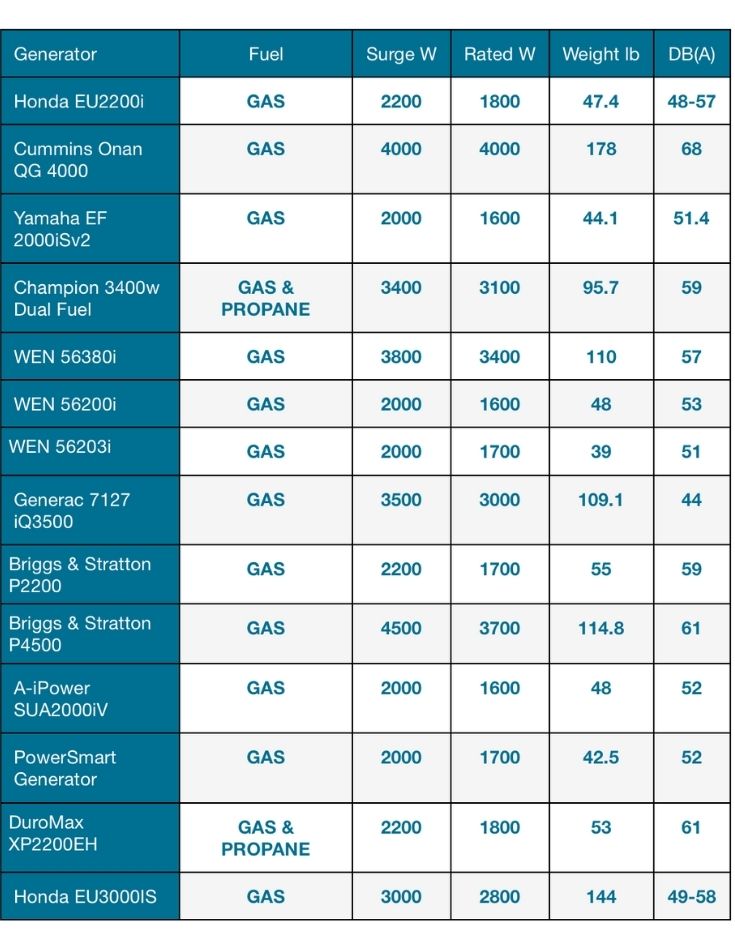
Best Portable RV Generator: Honda EU2200i
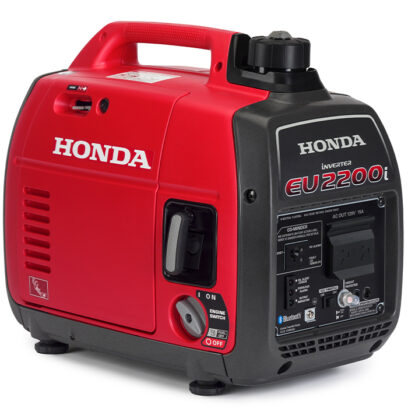
Honda manufacture some of the most reliable RV generators on the market.
With a range of generators for homes and businesses, as well as campers, trailers, and RVs, you know you’re getting a quality product.
The Honda EU2200i model is our top recommendation for anyone who wants to use their AC appliances off-grid but doesn’t need a massive generator to run air-conditioners.
Rated at 1800w and a startup of 2200w, you can comfortably run your TV, microwave, and other small household appliances.
It’s one of the quietest generators on our list and can’t be beaten under a light load.
Extra features include Bluetooth monitoring so you can keep an eye on performance from the comfort of your RV. It even provides service reminders so you’ll never miss an oil change.
Best In-built RV Generator: Cummins Onan QG 4000
The only in-built generator on the list, Cummins Onan is another highly rated engine manufacturer.
It’s a heavyweight generator but once fitted, you don’t need to do any heavy lifting.
The most crucial aspect of Cummins generators is the need to stay on top of the maintenance schedules.
Cummins provide a detailed breakdown of their strict maintenance schedule. Don’t skip any of this, or it could be a costly error.
Lightest RV Generator: Yamaha EF 2000iSv2
It was a close call, but the Honda just pipped this Yamaha model to the winning post for the best overall RV generator.
The Yamaha is a little cheaper than the Honda, but it’s a few lighter pounds lighter and almost as quiet.
With a handy fuel gauge and a DC outlet, it’s a perfect budget option for small AC appliances.
Best Dual Fuel Generator for RVs: Champion 3400w Dual Fuel
The Champion 3400w dual fuel generator is perfect for anyone who needs plenty of power and can get hold of propane.
Because propane is more environmentally friendly than gas, you can use propane whenever you can get it and gas as a backup.
With an auto-shutoff when oil levels run low, you can be confident you won’t seize the engine and have a costly repair bill on your hands.
And once the 3-year warranty is up, you’ll be supported by a free lifetime technical support service.
Best Value Large RV Generator: WEN 56380i Super Quiet 3800-Watt
We were compelled to include the WEN 56380i on our list of the best RV generators for the money.
It costs the least out of all the generators but is the most powerful.
Weighing in over 100lb, it won’t be easy to lift but has convenient wheels, making transporting it into position more comfortable.
The WEN 56380i is ideal for those on a low budget but need a powerful RV generator.
Best RV Generator for High-Powered Electronics – Honda Power Equipment EU3000IS
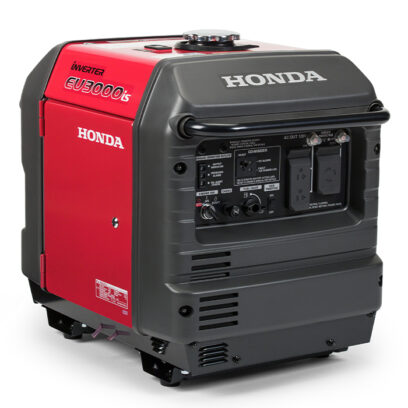
Honda is one of the major players in the power scene and makes some of the most durable generators available.
The Honda EU3000IS is no exception as it is one of the quietest portable Honda generators on the market.
Starting power of 3000 watts and running power of 2,800 watts, 3.4-gallon fuel tank and, at quarter load, it can run for up to 20 hours.
It would last up to 7 hours at rated load. The power output will work for RV AC units, coffee makers, refrigerators, computers, and microwaves used at different times.
Noting the danger of overloading, the generator comes with a pre-installed overload alarm.
On the control panel, there are features like low oil alert, circuit protector, engine, fuel valve, engine switch, and an output indicator.
Although quite pricey, Honda comes through again with an incredible product.
Best RV Generator for Conserving Fuel – WEN 56200i
We just couldn’t pass up on including the WEN 56200i too. At less than half the price of the Yamaha, this model performs at just about the same decibel levels.
Charge your devices and power TVs and computers without a nagging fear of damage thanks to clean power.
With the eco-mode feature, you can conserve gasoline and, in turn, save money since it automatically regulates fuel usage efficiently.
The 1-gallon tank guarantees up to 6 hours of run time at half-load and is a reliable source of quiet power. This gas-powered inverter generator is a top choice on a budget.
Lightest RV Generator – WEN 56203i
The WEN brand has some really impressive products on the market, so it’s no wonder that we have included them yet again.
The WEN 56203i is extremely lightweight, and that’s not even the best thing about this generator.
Fuel shutoff guarantees that your generator lasts longer. Since it uses fuel in the carburetor before auto powering off, you are guaranteed more usage time.
You can rest assured that your sensitive devices, including phones and computers, are charging safely.
Fuel consumption is maximized thanks to the eco-mode feature that automatically adjusts for efficiency.
It also comes in at about half the price of the WEN 56380i model, making it a good idea for a budget pick.
Best RV Generator for Sturdiness – Generac 7127 iQ-3500
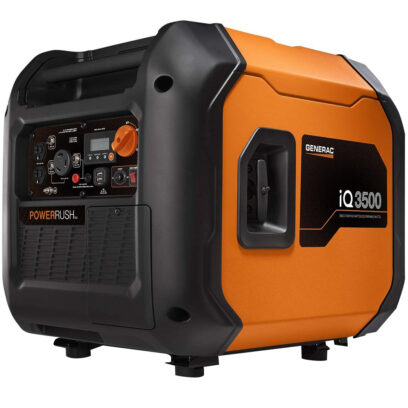
The Generac 7127 is a top choice for anybody looking for a sturdy unit to power their AC appliances.
It is highly durable, lightweight, and ranks highly amongst portable RV generators.
It offers the option of two engine speeds, featuring reduced noise and fuel consumption or maximal power.
A digital smart LCD shows you the fill level status, remaining run time, digital wattage meter, amongst other information.
The electric start and power dial with the three important operation settings make it easy to use.
This portable inverter generator allows you to conveniently run your electronics with an impressive power rating of 3,500 watts.
Most Compact RV Generator – Briggs & Stratton P2200
The Briggs & Stratton P2200 has a portable design and about 1700 running watts.
It features a control panel that provides you with essential information to monitor performance and is ready.
The three indicator lights inform you about low oil shutdown, overloading, or smooth running.
The inverter nature of the generator implies that it is environmentally friendly, providing clean energy for charging personal devices like mobile phones and DSLR cameras.
It has a reasonably low noise level, and the 1-gallon tank can run up to 8 hours on a quarter load.
The Quiet Power Technology that Briggs and Stratton uses serves a 3-fold function in reducing gas emissions, engine noise, and fuel usage.
Best Hi-Tech RV Generator – Briggs & Stratton P4500
Perhaps the most remarkable feature of the P4500 model is the built-in carbon monoxide tracking system. The system monitors CO levels and automatically shuts down when it gets too high.
The use of inverter technology ensures clean power that guarantees your sensitive electronics do not come to harm.
It features an automatic low oil shutdown feature and the Quiet Power Technology that reduces gas emissions, engine noise, and fuel consumption.
It weighs about 115 pounds, but you can move it around easily with the attached wheels.
With a 3.5-gallon gas tank, you can be sure of up to 16 hours run time at 25% load. This makes this model a pretty economical one.
Budget RV Generator – A-iPower SUA2000iV
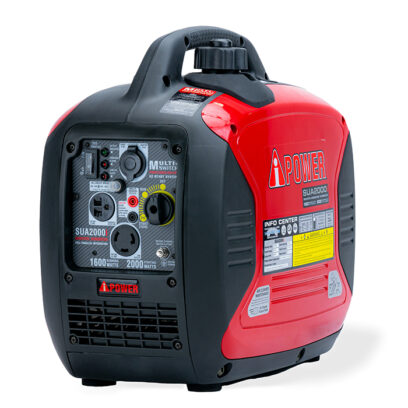
The A-iPower SUA2000iV is one of the cheapest RV generators on the market and doesn’t break the bank.
It’s not a very known brand, but it offers similar products from name brands like Yamaha and Honda.
Running power of 1600 watts to power electronics like laptops, television, tablets, and mobile phones clearly shows that it’s a steal!
Super portable and provides up to 7 hours run time at 50% load before refueling is required. The built-in fuel gauge accurately indicates when you’re running low.
There’s a two-year warranty on the generator if it is exclusively for residential use.
It is not the quietest generator at this budget price but works well.
Best Rv Generator for Easy Conveyance – PowerSmart Generator PS5020
PowerSmart is a pretty new brand in the market. The PowerSmart PS5020 is the first in their line of portable gas generators.
Design-wise, it’s got a nice handle for lifting and conveying, and the angled gas fill spout ensures you don’t spill gas.
It embodies the word compactness and is one of the most portable RV generators you would find. It features a large power control knob that is super easy to operate.
Running speed of 1700 watts implies that you can power your sensitive electronics without any hassle. Indicator lights are distinct and hard to miss.
Guarantees run time of up to 7 hours on quarter load.
Best Hybrid RV Generator – Duromax XP2200EH

Duromax boasts of several pretty durable generators, such as the DuroMax XP2200EH.
This is a great choice if you’re keeping an eye out for portable and powerful.
Features peak power of 2200 watts and 1800 running watts. One outstanding feature of this generator is the dual-fuel configuration.
You can use either gas or propane, which is better for the environment.
It has parallel capabilities to link it up with a second generator and increase power output.
At 50% load, you get 7 hours of run time using gasoline and 19 hours using propane.
This product makes for an environmentally friendly one.
In Conclusion
As with so many parts of campervan conversion and van life, choosing the best RV generator depends on your intended use and budget.
- If you want something cheap but powerful, choose the WEN 56380i
- For the best high-end RV generator to use without air-conditioners, choose the Honda EU2200i
- For the best dual fuel RV generator to use with air-conditioners, choose the Champion 3400w Dual Fuel
- For the best in-build onboard generator, choose the Cummins Onan QG 4000.
Graham Bogie

Graham is a seasoned marine electrical engineer with two decades of experience designing customized electrical systems for plant machinery and converting campers and overland vehicles. His expertise has led him to author the reputable Campervan Electrics Handbook and become the chief designer of the RV Wiring Design Tool. As a knowledgeable figure in the field, his YouTube channel, blog, Facebook group, and newsletter, offering electrical advice and product reviews, reach more than a million users each year.









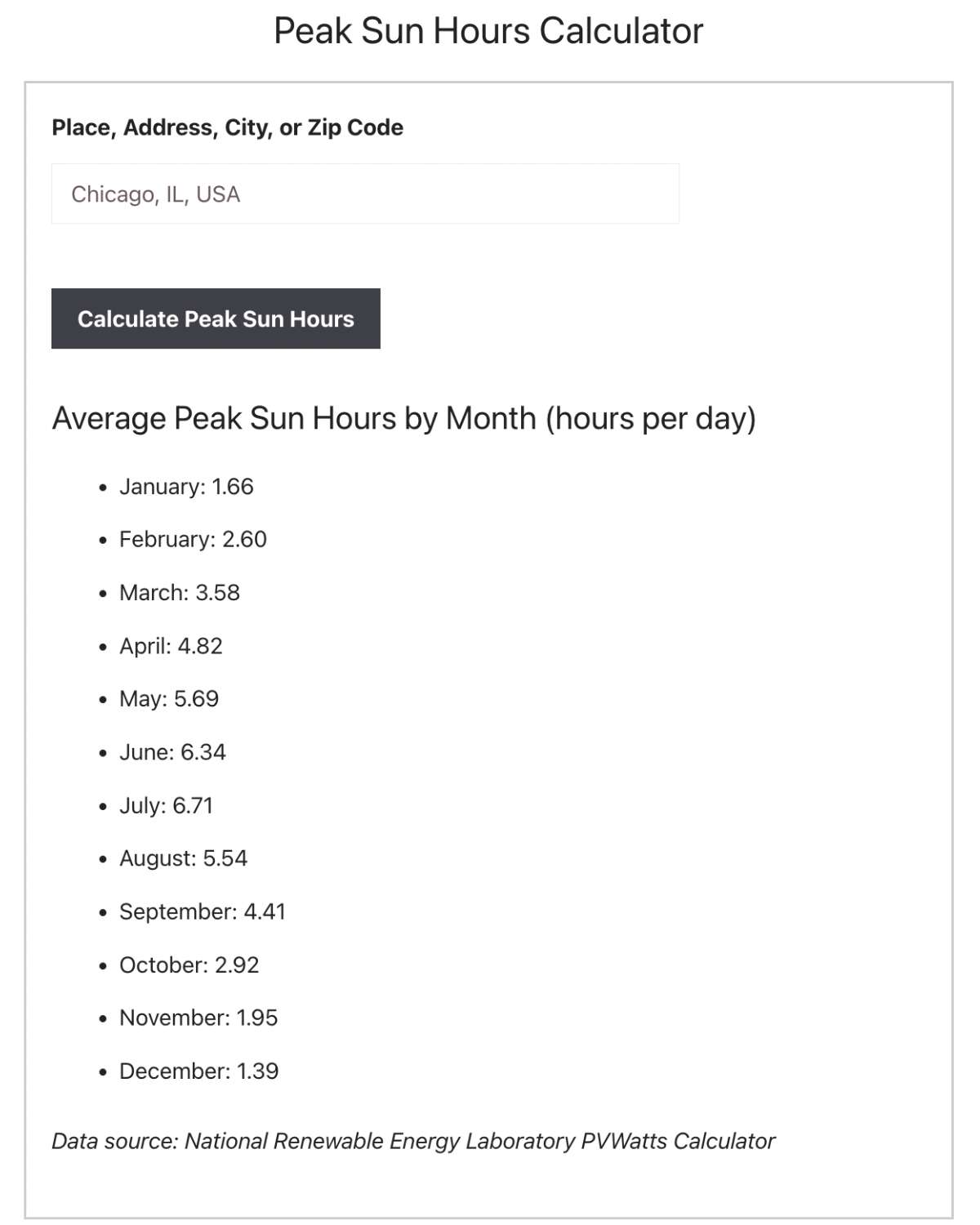
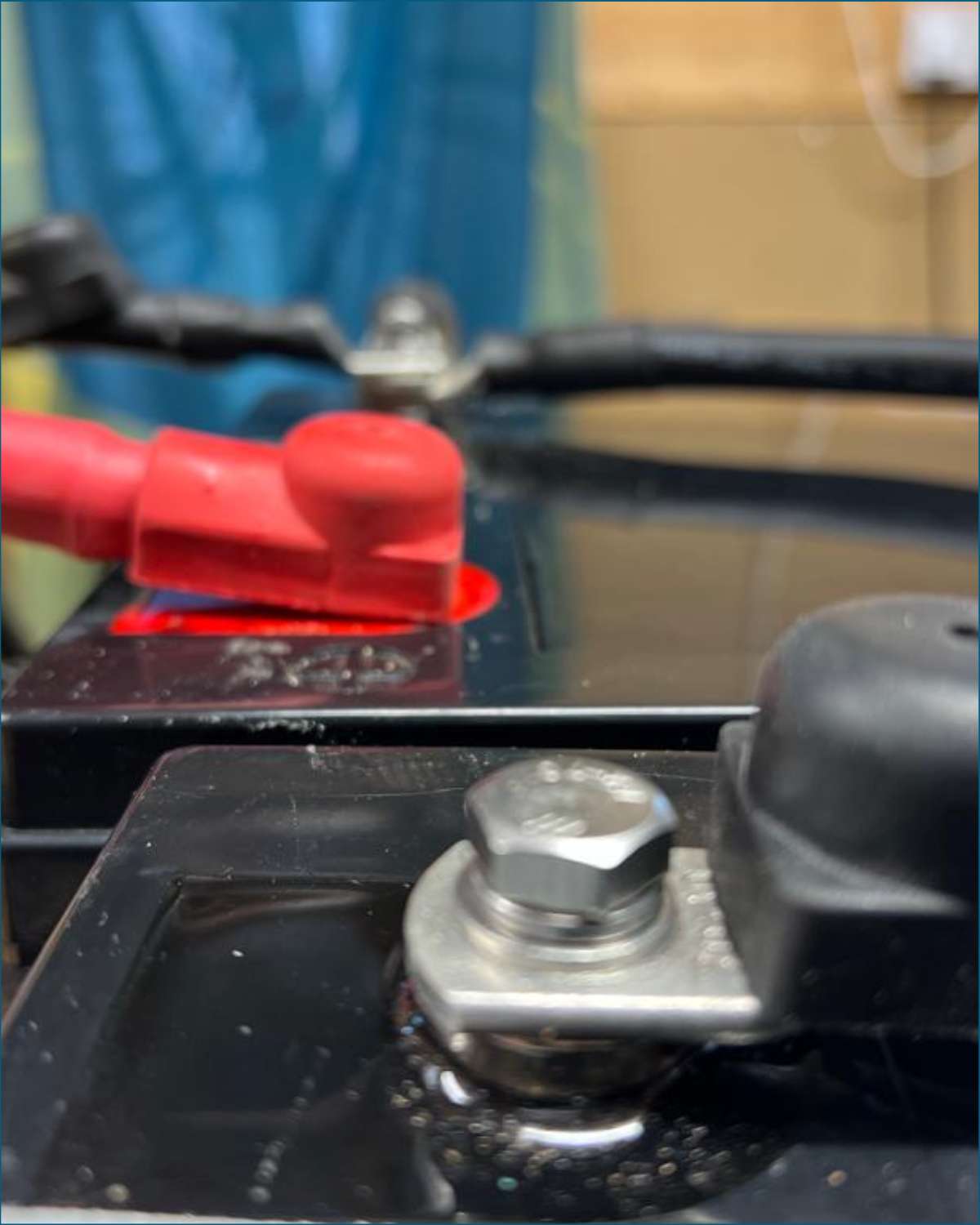

Wondering what you mean by propane bring the most efficient. Comparing BTU of gallon of propane to BTU gallon of gasoline seems to indicate the opposite. As for running AC unit, I have run my 13000 BTU AC on the Honda 2200. There isn’t any spare capacity and your point of altitude is well taken. My use was fairly close to sea level.
Hi Jay. You’re quite right! Good catch. Propane is less efficient than gasoline by about 26%. I’ve updated the post to reflect your valid point. Many air-con units have a start up of more than the 2200 the Honda can provide. Does your air-con need more than 2200w to start up? I’d be interest to know if the gennie labels err on the side of caution. Graham